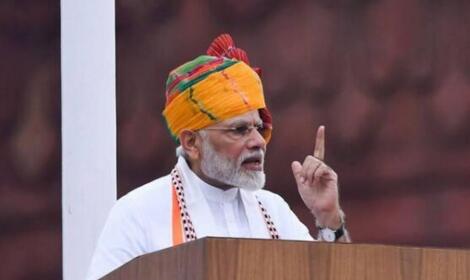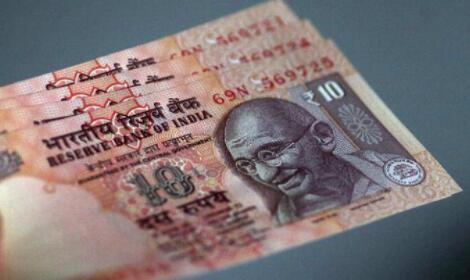拐点:宽松货币时代即将结束,这意味着金融动荡和经济不确定性
正文翻译
A turning point
拐点
Markets have fallen because the era of free money is coming to an end
金融市场下跌,因为宽松货币时代走向终结
Tighter money means financial volatility and economic uncertainty
货币紧缩意味着金融动荡和经济不确定性

After the interest-rate cuts and hectic central-bank bond-buying of early 2020, investors came to believe that central-bank stimulus would pretty much last forever. Today, however, as investors come to terms with the end of the era of free money, financial markets are in spasms. Markets now expect interest rates to increase four times in 2022 as the Fed fights the inflation that has lifted growth in the consumer-price index to 7%, a level barely imaginable a year ago. On January 26th the Fed confirmed that it would end its bond-buying programme and signalled that it would probably raise rates soon.
2020年初,在央行降息和疯狂购买债券后,投资者逐渐相信央行刺激政策几乎将一直持续下去。可如今随着投资者逐渐接受宽松货币时代的结束,金融市场陷入痉挛。随着美联储抑制通货膨胀,现在市场预期2022年利率将提高四倍。通货膨胀已经使消费者物价指数攀升至7%,这在一年前几乎无法想象。1月26日,美联储确认终止债券购买计划,并暗示很快可能加息。
This hawkish shift is the most important among many to have taken place in the world’s central banks in recent months. But it has only recently begun to bite in asset markets. After reaching a vertiginous high of nearly 40 times earnings at the turn of the year, the s&p 500 index of stocks has fallen by 9% in January (markets in Europe and Asia have fallen too, though by less). Markets’ intraday volatility has been just as striking, reflecting investors’ struggle to digest the consequences of tighter money.
这是近几个月来世界各大央行采取的最重大的强硬转变,但对资本市场的影响最近才开始显现。岁末年初,在标准普尔500指数的市盈率达到惊人的40倍后,1月份该指数下跌9%(欧洲和亚洲股市也出现下跌,但幅度较小)。股市的日内波动也很明显,反映出投资者在艰难消化货币紧缩带来的影响。
One is the repricing of long-dated assets. As interest rates collapsed during the pandemic, the value of securities with pay-offs stretching far into the future soared. Shares of technology firms like Zoom and Netflix, already sent higher by the switch to remote work and at-home entertainment, looked even more desirable as the return on bonds all but vanished. Their rise propelled the American stockmarket. Lately, however, long-term real interest rates have surged in anticipation of monetary tightening, causing a reversal of fortune. The turnaround has been dramatic for the most speculative stocks and novel instruments such as cryptocurrencies.
首先是长期资产的重新定价。随着疫情期间利率暴跌,具有长期收益的证券价值攀升。Zoom、Netflix等科技公司将业务转向远程办公和家庭娱乐,原本就推高了它们的股价,随着债券收益几乎消失,这些科技股看起来更加诱人,它们的崛起推动了美国股市。但最近长期实际利率在货币紧缩的预期中攀升,导致情况发生逆转。对于最具投机性的股票和加密货币等新型金融工具来说,这种转变带来的影响是剧烈的。
The effect of higher rates on the real economy is slower-burning and harder to anticipate. Ultra-cheap money let companies raise vast amounts of capital in 2021, a boom that will not be repeated. Homebuyers have assumed big mortgages as house prices have soared. Distressed firms have taken advantage of government-backed loans. Government debt-to- gdp ratios have ballooned, because of large, sustained deficits in the rich world and a collapse in growth in many emerging economies.
加息对实体经济的影响比较缓慢,并且难以预测。2021年,超低息贷款使企业筹集了大量资金,那种繁荣一去不复返。房价攀升使购房者承受巨额的按揭贷款,陷入困境的企业充分利用政府担保贷款。政府债务占国内生产总值的比率上升,这是因为发达国家维持巨大的财政赤字,以及许多新兴经济体增长放缓。
High indebtedness makes the world economy more sensitive to changes in monetary policy. Central banks must raise rates enough to quell inflation but not so much that they tip economies into recession as interest burdens rise. Households have stronger balance-sheets than you might expect given the depth of the recent recession, but their health depends in part on asset prices staying high. And if tighter money at the Fed causes turmoil in emerging markets, the consequences could rebound on America’s economy.
高负债使世界经济对货币政策的变化更加敏感。各国央行必须提高利率来抑制通货膨胀,但利率不能高到使经济陷入衰退的地步。考虑到最近经济衰退的程度,家庭财务状况比你预想的要稳健,但这部分取决于资产价格维持在高水平。如果美联储的货币紧缩政策引发新兴市场动荡,美国经济也将受到不利影响。
As they aim for a narrow landing strip, central banks also face high winds, because of the risk of war in Ukraine and uncertainties associated with the pandemic. Economists are struggling to forecast how many people who left the workforce in 2020 will eventually return—and the more that do, the less the chance that a damaging wage-price spiral will take hold.
由于乌克兰战争风险和疫情的不确定性,着陆空间有限的央行还面临着巨大阻碍。经济学家正在努力预测,2020年的失业人口有多少能重返工作岗位,重新就业的人越多,工资-价格螺旋形上升的可能性就越小。
They are also grappling with doubts over when consumers will shift their spending back to services, easing the upward pressure on goods prices caused by bunged-up supply chains. Economic data have become harder to interpret. If retail sales fall, for example, does it reflect economic weakening, or a welcome return to normal patterns of consumption?
央行也在解决这样的疑虑,即消费支出何时重返服务领域,从而缓解供应链受阻所引发的物价上行压力。经济数据已变得更加难以解读,举例来说,如果零售业的销售额下滑,这究竟反映出经济疲软,还是消费模式可喜地回归常态?
The uncertainty about the global economy’s strength and its ability to withstand higher rates, combined with central banks’ twitchy trigger-fingers as they worry about inflation, means that markets are entering a new phase. During much of the pandemic, cheap money drove asset prices to astonishing highs even as the world economy was in the dumps. Today they are tightly bound to its fate.
全球经济实力及其承受加息能力的不确定性,再加上担心通货膨胀而焦虑等待扣动扳机的央行,意味着市场正在步入新的阶段。在疫情的大部分时间里,当世界经济低迷时,低息贷款将资产价格推至惊人的高度,如今资产价格与世界经济的命运休戚相关。
拐点
Markets have fallen because the era of free money is coming to an end
金融市场下跌,因为宽松货币时代走向终结
Tighter money means financial volatility and economic uncertainty
货币紧缩意味着金融动荡和经济不确定性

After the interest-rate cuts and hectic central-bank bond-buying of early 2020, investors came to believe that central-bank stimulus would pretty much last forever. Today, however, as investors come to terms with the end of the era of free money, financial markets are in spasms. Markets now expect interest rates to increase four times in 2022 as the Fed fights the inflation that has lifted growth in the consumer-price index to 7%, a level barely imaginable a year ago. On January 26th the Fed confirmed that it would end its bond-buying programme and signalled that it would probably raise rates soon.
2020年初,在央行降息和疯狂购买债券后,投资者逐渐相信央行刺激政策几乎将一直持续下去。可如今随着投资者逐渐接受宽松货币时代的结束,金融市场陷入痉挛。随着美联储抑制通货膨胀,现在市场预期2022年利率将提高四倍。通货膨胀已经使消费者物价指数攀升至7%,这在一年前几乎无法想象。1月26日,美联储确认终止债券购买计划,并暗示很快可能加息。
This hawkish shift is the most important among many to have taken place in the world’s central banks in recent months. But it has only recently begun to bite in asset markets. After reaching a vertiginous high of nearly 40 times earnings at the turn of the year, the s&p 500 index of stocks has fallen by 9% in January (markets in Europe and Asia have fallen too, though by less). Markets’ intraday volatility has been just as striking, reflecting investors’ struggle to digest the consequences of tighter money.
这是近几个月来世界各大央行采取的最重大的强硬转变,但对资本市场的影响最近才开始显现。岁末年初,在标准普尔500指数的市盈率达到惊人的40倍后,1月份该指数下跌9%(欧洲和亚洲股市也出现下跌,但幅度较小)。股市的日内波动也很明显,反映出投资者在艰难消化货币紧缩带来的影响。
One is the repricing of long-dated assets. As interest rates collapsed during the pandemic, the value of securities with pay-offs stretching far into the future soared. Shares of technology firms like Zoom and Netflix, already sent higher by the switch to remote work and at-home entertainment, looked even more desirable as the return on bonds all but vanished. Their rise propelled the American stockmarket. Lately, however, long-term real interest rates have surged in anticipation of monetary tightening, causing a reversal of fortune. The turnaround has been dramatic for the most speculative stocks and novel instruments such as cryptocurrencies.
首先是长期资产的重新定价。随着疫情期间利率暴跌,具有长期收益的证券价值攀升。Zoom、Netflix等科技公司将业务转向远程办公和家庭娱乐,原本就推高了它们的股价,随着债券收益几乎消失,这些科技股看起来更加诱人,它们的崛起推动了美国股市。但最近长期实际利率在货币紧缩的预期中攀升,导致情况发生逆转。对于最具投机性的股票和加密货币等新型金融工具来说,这种转变带来的影响是剧烈的。
The effect of higher rates on the real economy is slower-burning and harder to anticipate. Ultra-cheap money let companies raise vast amounts of capital in 2021, a boom that will not be repeated. Homebuyers have assumed big mortgages as house prices have soared. Distressed firms have taken advantage of government-backed loans. Government debt-to- gdp ratios have ballooned, because of large, sustained deficits in the rich world and a collapse in growth in many emerging economies.
加息对实体经济的影响比较缓慢,并且难以预测。2021年,超低息贷款使企业筹集了大量资金,那种繁荣一去不复返。房价攀升使购房者承受巨额的按揭贷款,陷入困境的企业充分利用政府担保贷款。政府债务占国内生产总值的比率上升,这是因为发达国家维持巨大的财政赤字,以及许多新兴经济体增长放缓。
High indebtedness makes the world economy more sensitive to changes in monetary policy. Central banks must raise rates enough to quell inflation but not so much that they tip economies into recession as interest burdens rise. Households have stronger balance-sheets than you might expect given the depth of the recent recession, but their health depends in part on asset prices staying high. And if tighter money at the Fed causes turmoil in emerging markets, the consequences could rebound on America’s economy.
高负债使世界经济对货币政策的变化更加敏感。各国央行必须提高利率来抑制通货膨胀,但利率不能高到使经济陷入衰退的地步。考虑到最近经济衰退的程度,家庭财务状况比你预想的要稳健,但这部分取决于资产价格维持在高水平。如果美联储的货币紧缩政策引发新兴市场动荡,美国经济也将受到不利影响。
As they aim for a narrow landing strip, central banks also face high winds, because of the risk of war in Ukraine and uncertainties associated with the pandemic. Economists are struggling to forecast how many people who left the workforce in 2020 will eventually return—and the more that do, the less the chance that a damaging wage-price spiral will take hold.
由于乌克兰战争风险和疫情的不确定性,着陆空间有限的央行还面临着巨大阻碍。经济学家正在努力预测,2020年的失业人口有多少能重返工作岗位,重新就业的人越多,工资-价格螺旋形上升的可能性就越小。
They are also grappling with doubts over when consumers will shift their spending back to services, easing the upward pressure on goods prices caused by bunged-up supply chains. Economic data have become harder to interpret. If retail sales fall, for example, does it reflect economic weakening, or a welcome return to normal patterns of consumption?
央行也在解决这样的疑虑,即消费支出何时重返服务领域,从而缓解供应链受阻所引发的物价上行压力。经济数据已变得更加难以解读,举例来说,如果零售业的销售额下滑,这究竟反映出经济疲软,还是消费模式可喜地回归常态?
The uncertainty about the global economy’s strength and its ability to withstand higher rates, combined with central banks’ twitchy trigger-fingers as they worry about inflation, means that markets are entering a new phase. During much of the pandemic, cheap money drove asset prices to astonishing highs even as the world economy was in the dumps. Today they are tightly bound to its fate.
全球经济实力及其承受加息能力的不确定性,再加上担心通货膨胀而焦虑等待扣动扳机的央行,意味着市场正在步入新的阶段。在疫情的大部分时间里,当世界经济低迷时,低息贷款将资产价格推至惊人的高度,如今资产价格与世界经济的命运休戚相关。
评论翻译
暂无评论。










